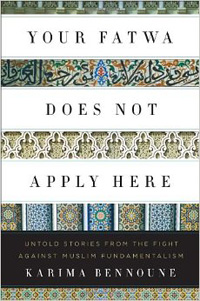Book Notes
 Karima Bennoune, Your Fatwa Does Not Apply Here; Untold Stories From the Fight Against Muslim Fundamentalism (New York: W.W. Norton, 2013), 402pp.
Karima Bennoune, Your Fatwa Does Not Apply Here; Untold Stories From the Fight Against Muslim Fundamentalism (New York: W.W. Norton, 2013), 402pp.
The violence that has beset much of the Middle East has put westerners in an awkward position. How do you condemn suicide bombings and public beheadings without incurring the charge of being anti-Islam? Karima Bennoune is an Algerian professor of international law at the University of California-Davis School of Law. She describes herself as a "secular person" and "confirmed agnostic" who argues for an "unabashed challenge of fundamentalism." She opposes those on the right who feed anti-Muslim agendas, but she's just as hard on liberal multiculturalists who make concessions in the name of tolerating religious differences.
We often hear the question, "Why don't Muslims speak out against the violence perpetrated by their religion?" After all, the overwhelming majority of victims of Muslim violence are Muslims. Bennoune's oral history shows that many Muslims do speak out. She collects the stories of Muslims who are repudiating violence, almost always at great risk to their personal safety. Her book is based upon interviews with 286 Muslims from 26 countries. There's a liberal mullah in Herat. School girls performing in an arts festival in Lahore. Artists and journalists of all sorts. A "cultural cafe" in Karachi. School teachers in the West Bank. A cleric resisting the recruitment efforts of Al Shabaab among Somali refugees in Minneapolis.
"Finding a principled position in this political universe," Bennoune admits, "is not easy." Some people work within Islam to reinvigorate its history as a life-affirming and even liberal-minded religion. Others find this approach hopeless, and appeal to universal human rights that transcend all religions. Some are hopeful, others are pessimistic, and still others leave — exacerbating the problem of brain drain. They often find themselves between secular autocracy and dictator-thugs like Mubarak, and religious extremists and theocracy like the Taliban. Horrible socio-economic conditions, weak or failing states, and the foreign policies of western countries fuel these fires. But Bennoune's book hopes for the best; it's a powerful bearing-witness to the atrocities of fundamentalism, to truth and memory, and to the stories of the victims.


